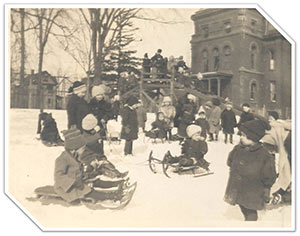 It was with genuine regret, perhaps even a touch of personal dismay, that I learned of the formal closing of the Daughters of Charity’s historic mission here in Milwaukee, effective Aug. 24. An era of special grace has come to its end. They were Milwaukee’s personal connection to the charism of St. Mother Elizabeth Ann Seton, the foundress of the American branch of that heroic community which had first appeared in 17th century France under the guidance of SS. Louise de Marillac and Vincent de Paul. They were the first vowed religious who came to Milwaukee in response to Bishop John Martin Henni’s urgent pleas.
It was with genuine regret, perhaps even a touch of personal dismay, that I learned of the formal closing of the Daughters of Charity’s historic mission here in Milwaukee, effective Aug. 24. An era of special grace has come to its end. They were Milwaukee’s personal connection to the charism of St. Mother Elizabeth Ann Seton, the foundress of the American branch of that heroic community which had first appeared in 17th century France under the guidance of SS. Louise de Marillac and Vincent de Paul. They were the first vowed religious who came to Milwaukee in response to Bishop John Martin Henni’s urgent pleas.
The history of Milwaukee records that it was the afternoon of Aug. 20, 1846 when the little band of three came down the gang plank of their Great Lakes steamer from Buffalo, and walked from Higby’s pier to St. Peter, the little church on the northwest corner of State and Jackson streets.
Fr. Martin Kundig, pastor of St. Peter, had traveled with them by stagecoach and steamer from Baltimore, and walked with them to the home of Bishop Henni on Jackson and Wells (then called Oneida) Street. Srs. Simeon, Mary Paul and Agnes Frances showed up at his door, eager to do the work of education and care for the sick so desperately needed by the early pioneer families of the southeastern Wisconsin territory. Children from the St. Rose Orphanage, operated by the Daughters of Charity, go sledding in this 1921 photo. (Submitted photo courtesy the Daughters of Charity archives)
Children from the St. Rose Orphanage, operated by the Daughters of Charity, go sledding in this 1921 photo. (Submitted photo courtesy the Daughters of Charity archives)
They visited the sick in their homes and assisted at the birth of babies. Hospitals were only for those in quarantine and for the dying. It was fear of contagion which led to the establishment of St. John’s Infirmary (the cathedral’s outreach to the infirm), later relocated in the northern farm fields in 1858 and rechristened St. Mary.
During the prior year, Sr. Monica, one of the group’s more recent arrivals, divided her day between working with the sick and digging out stumps from the lakeshore cliffs or painting the floors of the new building.
Throughout the history of the church, women have formed themselves into groups of service to address the pressing needs of the world in which they lived. With special urgency since the renewal of the 16th century, these associations for apostolic life had focused on the spiritual and corporal works of charity. Every year and in every place the Gospel had taken on new life as the hungry were fed, the sick comforted, children instructed and the dying assisted.
Any time a need was seen as untended by anyone else, the sisters were there. When that need was finally addressed by society’s new awareness, or resolved in some other fashion, the communities either went on to other concerns or went out of existence. In each generation, the Gospel has been embraced and courageous lives have been made holy.
Women religious have been crucial to the life of the archdiocese from its beginning. Each religious community has nurtured its unique gifts and served in outstanding ways. Dominican Sr. Rose Thiering from the Racine Dominicans, for example, born on a farm near Plain, Wis., went on to be internationally recognized for her work with post-Holocaust Judaism. School Sister of St. Francis Helena Steffensmeier of the Layton Boulevard Franciscans became nationally known for her carvings and oil paintings
More recently, Sr. Edna Lonergan of the South Lake Drive Franciscans is a leader in intergenerational care for the elderly. Sr. Josephe Marie Flynn, a School Sister of Notre Dame, rallied community support to protect a terrified Congolese woman from being deported by the U.S. government, facing certain torture and death if sent back to her native land … and wrote the book “Rescuing Regina” to document the terrifying struggle.
The examples are almost endless, and merely mentioning these few figures risks omitting countless others of equal or greater dedication.
Inspired by profound faith in God and charity for all of God’s people, women religious have embraced the heartaches of our portion of God’s vineyard, and we have all been blessed.
In mid-May I had the privilege of preaching a retreat to some 105 retired School Sisters of Notre Dame in Elm Grove. They are wise and often very shrewd women whose lives have been marked by the sign of the cross and the promise of the Resurrection.
As the four remaining Daughters of Charity pack their suitcases for the new missions assigned to them by the leaders of their newly consolidated province, they leave a strong hospital committed to care for God’s sick and infirm. We have been blessed by their ministries since 1846, and we ask to be remembered in their prayers for the years yet to come.
When all is said and done, I find myself wondering which pressing need in our contemporary neighborhoods will next summon such women of faith to serve and heal our hearts. The love of Christ simply will not be denied! The spirit of those first three Daughters of Charity will live on in our midst, and not only in the hospital which they founded!
